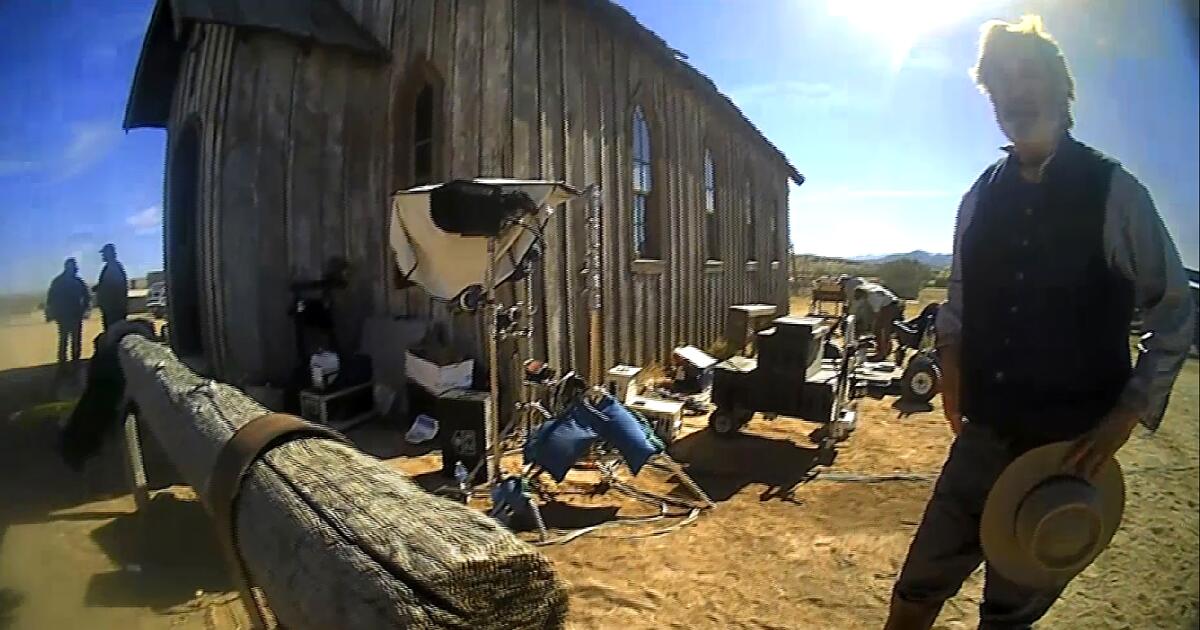New Mexico judge denies Alec Baldwin’s motion to dismiss criminal case in ‘Rust’ shooting
A New Mexico judge denied a motion to dismiss the involuntary manslaughter case against Alec Baldwin, clearing the way for the high-profile actor to stand trial for his alleged role in the deadly “Rust” movie shooting.
New Mexico First Judicial District Judge Mary Marlowe Sommer’s decision late Friday was a setback to Baldwin and his legal team, who had argued that prosecutors were bent on winning a conviction of the 66-year-old actor-producer at all costs following the October 2021 accidental shooting of cinematographer Halyna Hutchins on the low-budget western movie set near Santa Fe.
Baldwin is scheduled to stand trial in a Santa Fe courtroom in July on the felony charge that, if convicted, carries a prison sentence of up to 18 months. He has pleaded not guilty.
In January, grand jurors in Santa Fe County indicted Baldwin on an involuntary manslaughter charge, determining there was sufficient evidence that he acted negligently by pointing a loaded gun at Hutchins without first checking the weapon.
After the indictment, Baldwin’s lawyers pored over transcripts of the grand jury proceedings to try to build a case that Special Prosecutor Kari T. Morrissey had at times shut down testimony that could have been beneficial to their client.
“The state has sought to convict and imprison Baldwin for an accident caused by the mistakes of others,” Baldwin’s attorney Luke Nikas wrote in a motion to dismiss the indictment.
Baldwin’s attorneys argued in a hearing last week that Morrissey failed in her duty to provide testimony in a “fair and impartial manner.”
Marlowe Sommer on Friday wrote in her 19-page ruling that defense attorneys failed to provide evidence of “prosecutorial bad faith.”
At issue was whether grand jurors were fully informed that they could call witnesses from a list provided by Baldwin’s attorneys. The judge wrote that the special prosecutor read a letter from Baldwin’s side during the proceedings, and that jurors also were allowed to question witnesses.
Judge Mary Marlowe Sommer, center, talks with prosecutor Kari T. Morrissey, left, and Hannah Gutierrez’s defense attorney Jason Bowles during Gutierrez’s February 2024 trial in Santa Fe, N.M.
(Eddie Moore / Albuquerque Journal)
On the afternoon of Oct. 21, 2021, Hutchins, Baldwin, Souza and about a dozen other crew members were gathered in a rustic church at Bonanza Creek Ranch, south of Santa Fe, to prepare for an upcoming scene. Assistant director David Halls, who was the on-set safety coordinator, handed the gun to Baldwin, declaring that it was “cold,” meaning there was no ammunition inside, according to numerous witnesses.
The actor was sitting in a pew, facing the door of the church. Hutchins and Baldwin had discussed a close-up camera angle of the gun’s muzzle — a view that Hutchins, the director of photography, wanted as a way to heighten the drama in advance of a gunfight scene. Baldwin has said Hutchins told him to slowly pull his Colt .45 revolver from his holster and point it at the camera.
He did, and that’s when the gun went off.
Hutchins died from her wounds. The film’s director, Joel Souza, was injured by the same bullet but has since recovered.
Baldwin’s case has featured numerous twists and turns, including when the actor known for NBC’s “30 Rock” and parodying former President Trump in skits on “Saturday Night Live,” participated in an ABC News interview, broadcast in December 2021, less than six weeks after the tragedy. Baldwin described for news anchor George Stephanopoulos how he pointed the gun at Hutchins and cocked the hammer.
“I didn’t pull the trigger,” Baldwin said, blaming others for the tragedy.
Since then, investigators and FBI analysts have performed tests to demonstrate that Baldwin must have pulled the trigger.
However, during the FBI tests in 2022 at the agency’s lab in Quantico, Va., forensic analysts used a rawhide mallet to strike the gun so hard that components of the gun fractured. Baldwin’s attorney’s have cited the broken parts as evidence that the weapon was compromised before Baldwin handled it.
The first set of prosecutors had to step down after a string of missteps, including an attempt to charge Baldwin on a penalty enhancement that called for a mandatory five-year prison sentence. That penalty wasn’t in effect at the time of the tragedy. The initial prosecutors also made statements about holding Baldwin responsible for his actions, prompting criticism from defense attorneys that such commentary was prejudicial against the actor.
Shortly after Morrissey and her law partner Jason J. Lewis joined the case last spring, they dropped the charges against Baldwin, saying they needed time to review evidence and address legal issues raised by Baldwin’s team.
Last week, Morrissey bristled at suggestions that it was problematic for her to seek an indictment after dropping the charges against Baldwin last year. She said it was Baldwin’s lead attorney, Luke Nikas, who asked for the charges to be dropped, and she agreed.
At the time, the prosecutors said they needed time to investigate whether the gun had been modified prior to its arrival on the film set, as Baldwin’s team has suggested.
Prosecutors have won two convictions for negligence leading to Hutchins’ death.
In March, a Santa Fe jury convicted armorer Hannah Gutierrez of involuntary manslaughter. Morrissey had argued that Gutierrez, whose job was handling the guns, was the most responsible for the tragedy. The jury deliberated only about two hours after hearing evidence during a two-week trial. Last month, Marlowe Sommer sentenced Gutierrez, 26, to the maximum sentence of 18 months in a New Mexico women’s prison.
Last year, Halls pleaded no contest to negligent use of a deadly weapon and received a suspended six-month sentence.

